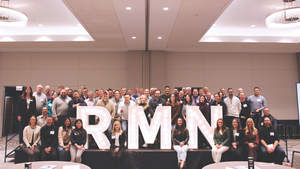FMI ASIA MART '95: A CONDUIT FOR TRADE
WASHINGTON -- For American companies seeking to build relationships with potential retail customers in the vast Asia market, there are few quick fixes, according to Tim Hammonds, president and chief executive officer of the Food Marketing Institute here. The same is true for FMI's approach to Asia. It has made a commitment to building a trade forum for the Asian market, which is about to make its
October 9, 1995
ELLIOT ZWIEBACH
WASHINGTON -- For American companies seeking to build relationships with potential retail customers in the vast Asia market, there are few quick fixes, according to Tim Hammonds, president and chief executive officer of the Food Marketing Institute here. The same is true for FMI's approach to Asia. It has made a commitment to building a trade forum for the Asian market, which is about to make its debut. FMI AsiaMart '95 will run Oct. 18 to 20 at the Hong Kong Convention Center. "What's important to doing business in that part of the world is both formal and informal relationships that develop over time," Hammonds told SN. "In Asia you don't just make a sales call. You really need to build long-term relationships to do business, and being introduced under the right circumstances is very important to the development of those long-term relationships. "So for U.S. companies seeking entree to the Asian market, attending and exhibiting at AsiaMart '95 and being introduced in that context to the companies they may be doing business with should make the initial steps much easier. "And in the long term, from FMI's point of view, AsiaMart is a way for us to build a reputation to position our members for the day when the Chinese market finally opens." Hammonds said convention highlights will include the following:A major emphasis on developing trade with China, including a preconvention seminar and workshops on doing business in China.
Many U.S. exhibitors on the trade show floor seeking to broaden their exposure in Asia. These will include some U.S. distributors hoping to sell more private-label products abroad and several state departments of agriculture hoping to find new outlets for their home-grown commodities.
Many Asian exhibitors on the trade show floor who will seek new customers in the United States and other Asian countries. AsiaMart is scheduled to run every two years, with AsiaMart '97 set for Hong Kong again, "unless the political situation there, once China takes over in 1997, requires us to move the meeting to Singapore, where FMI is also holding space," Hammonds said. No location has been set for AsiaMart '99, he added, but FMI intends to hold the convention in either Hong Kong or Singapore for the foreseeable future, "because those are the two major trading centers for the Asia market right now." AsiaMart evolved for two reasons, Hammonds told SN: to accommodate the increasing number of Asians attending FMI's annual Chicago convention and to acknowledge the growing importance of Asia as a potential market for U.S. goods. "The number of international companies attending our Chicago show has grown during the last six or eight years, and the number of Asians coming to Chicago has been building over the past five years," he explained. "However, because of cost and distance, most Asian companies send only a limited number of people, and most of those are from the executive level. And on the exhibit floor, while we have had U.S. companies that were selling to Asia, we've had no representation of Asian companies interested in selling to the U.S." AsiaMart '95 is likely to attract Asian executives from all different levels of their companies, including many at the buying and selling level, Hammonds noted. A second reason for the development of AsiaMart, he said, is the growing importance of Asia in the world's economy. "Asia is the largest and fastest growing market in the world for all products. "It represents a tremendous market for American food products and technology, and any number of supermarkets in this country are importing nonfood products from Asia. "And while the U.S. and European economies are growing at a rate of 2% to 4% a year, the Asian economies are growing 10% to 20% a year. And 50% of the population in most Asian markets is under 30, so there are young families there with money to spend who are already very familiar with American products." Hammonds said FMI anticipates between 2,000 and 3,000 people will register for AsiaMart '95, about the same number that attended the first FMI MarkeTechnics meeting in 1992 and FMI's first general merchandise/health and beauty care conference in 1990. Of the total, the vast majority will be Asians, with groups from Japan, Hong Kong, Singapore, Korea and some from China. The second largest group -- about 200 retailers -- will hail from the United States, and there also will be groups from Australia, Europe and Latin America attending, Hammonds said. "We had originally anticipated that AsiaMart would be just a U.S. and Asian event, but as we've put the show together, we've had registrants from all over the world. And because so many parts of the world are trading aggressively with Asia, AsiaMart '95 has become more of an international event than we had once thought," Hammonds explained.
He said he expects the exhibit floor to contain about the same number of U.S. companies seeking Asian outlets as there will be Asian companies seeking U.S. outlets.
Most Asian exhibitors will be seeking to sell general merchandise items to the United States, Hammonds said, "but there will also be a large number of exhibitors from Asia interested in selling food products to other Asian markets. "And there will be several American companies exhibiting there that we did not anticipate -- companies like Winn-Dixie, Fleming, Supervalu, Certified Grocers of California, Topco, United Grocers and IGA -- that have been approached by Asian retailers interested in their private-label lines." In addition, the departments of agriculture from Ohio, Oregon and Illinois will have booths at the exhibit -- as similar state groups have had at the Chicago convention -- to seek out international buyers for the commodities they grow. Other exhibitors will include manufacturers from Israel, Germany, Scotland, Canada and Mexico, plus ABRAS, FMI's counterpart in Brazil, which will be trying to promote sales from several Brazilian companies interested in Asian markets. Hammonds said he expects up to 130 companies to exhibit at the show. The exhibit floor will be about 30,000 square feet -- considerably smaller than the 1 million square feet at the Chicago convention but comparable in size to the floor at the first MarkeTechnics show, he noted. As with FMI's Chicago convention, AsiaMart '95 will feature concurrent workshops in the mornings, with the exhibit floor open in the afternoon, Hammonds said. One of the major subjects on many exhibitors' minds will be China, he noted. "There's a change coming soon in China's leadership, and no one knows for sure yet how that will impact the operation of business in China." In a session scheduled for Oct. 18, just prior to the formal opening of AsiaMart '95, Michael McNabb, managing principal at Coopers & Lybrand China Consulting, based in Shanghai, China, will make a two-hour presentation on the best practices of foreign corporations investing in or doing business in China, Hammonds noted. Other workshops will feature a mix of American and Asian speakers, and will focus on the potential impact of supercenters in Asia, Efficient Consumer Response, category management, supply chain management, in-store technology, marketing innovations, perishables merchandising, frozen food merchandising, customer service and loss prevention.
Workshops will feature concurrent translations into Japanese, Korean, Mandarin Chinese and English.
About the Author
You May Also Like






